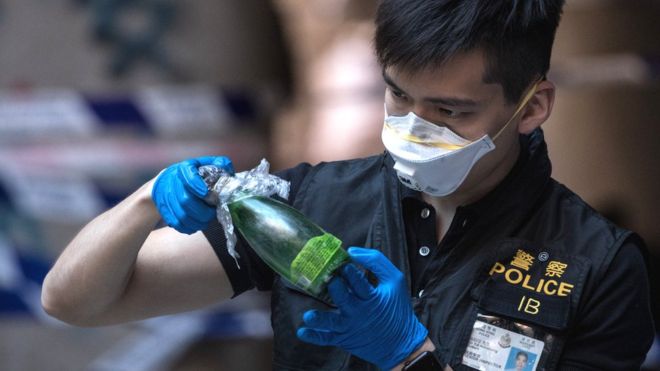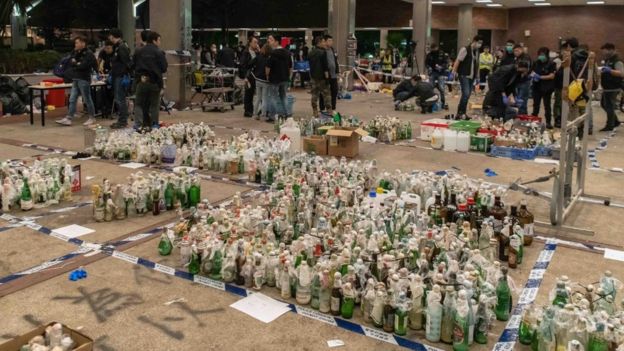PolyU: Hong Kong police find almost 4,000 petrol bombs on campus

GETTY IMAGES
BBC
Hong Kong police say they found almost 4,000 petrol bombs in two days while clearing the Polytechnic University campus.
The campus was the site of a fiery stand-off between activists and police – and on Thursday, with the protesters having left, the officers moved in.
They found 3,989 petrol bombs; 1,339 explosive items; 601 bottles of corrosive liquids; and 573 weapons.
The campus has now been handed back to the university management.
Protesters barricaded themselves inside the campus two weeks ago.
The authorities responded by sealing off the university grounds, trapping more than 1,000 protesters inside at one point.

GETTY IMAGES – The university had been held by students for weeks
Activists – armed with bricks, petrol bombs, and even bows and arrows – attacked the police lines during the siege.
Over the past week, most protesters either surrendered or escaped. On Friday, police said:
- 1,377 had been arrested because of the PolyU protests
- 810 were arrested when leaving the campus, with 567 nearby
- 318 people under the age of 18 had their names recorded

Elvis, a 19-year-old student, spent five days inside PolyU during the siege.
“Chairs and tables were all taken out to create barricades so everyone was sleeping on the ground but it was comfortable because we were so tired,” he told the the BBC.
“Many people were caught. We tried to escape three times but kept failing because the police kept firing teargas and rubber bullets at us. I don’t think they wanted us to leave. It was a nightmare. There were blood everywhere.”
The protesters cooked for themselves with supplies provided by members of the press or medical team.
“Most of the water tasted like teargas. That’s why we had to drink bottled waters. On the fourth day, there were no fresh water bottles left, so we drank water from bottles left behind.”
Some protesters were able to escape by climbing down ropes from a road bridge, but Elvis said it was too dangerous and he didn’t want to leave others behind. He injured his leg in one attempt.
Some of his friends escaped through an underground tunnel but he said “it smelled really bad.”
He was eventually taken out of university on a stretcher bed on day five, with his personal information marked down and his photo taken, before being transferred to a hospital.

Hong Kong’s protests started in June against a proposed law to allow extradition to mainland China, but they have transformed into a larger pro-democracy movement.
Last Sunday, Hong Kong held local council elections that were seen as a barometer of public opinion towards the government and the protesters.
The elections saw a landslide victory for the pro-democracy movement, with 17 of the 18 councils now controlled by pro-democracy councillors.
This Friday saw another small demonstration in the centre of Hong Kong, with activists insisting on their list of five key demands.
The list includes full democracy for the territory and an inquiry into police behaviour.
A former British colony, Hong Kong is part of China, but enjoys “special freedoms” under the “one country, two systems” arrangement.
Those are set to expire in 2047, and many in Hong Kong are uncertain about their future.
